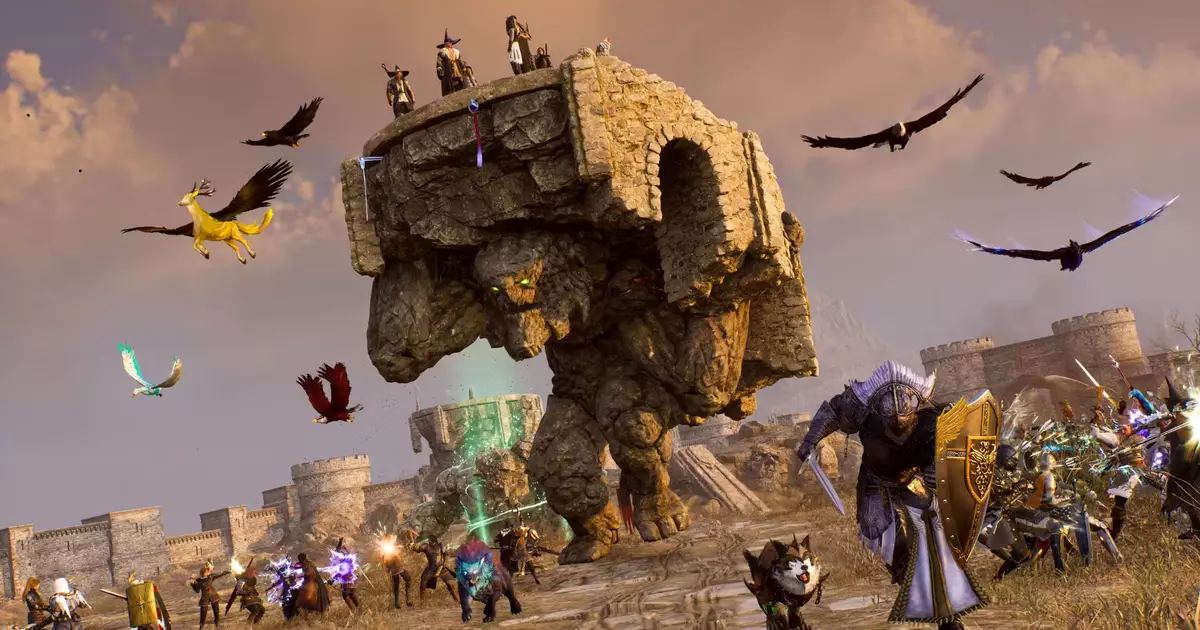The online gaming landscape is perpetually shifting, and one of the latest titles to emerge from the tumultuous seas of hype is Amazon and NCSOFT’s **Throne and Liberty**. Having just launched yesterday, it has already made a remarkable impact on Steam, earning a spot as one of the platform’s most-played games. Positioning itself comfortably behind the celebrated **Black Myth: Wukong**, it suggests that the RPG has piqued considerable interest among gamers. The game’s swift rise can be attributed to an earlier beta release that successfully captured the community’s imagination. Yet, while it has succeeded in establishing a presence, it still has its work cut out for it to reach the heights of some of its more established rivals.
Set in a vibrant medieval fantasy realm, **Throne and Liberty** captivates players with the allure of mystical creatures, towering golems, and valiant knights. Its central gameplay mechanic—transforming into various animals, including fish, birds, and massive golems—introduces a unique twist to exploration and combat. This adds a layer of strategic depth, empowering players to navigate obstacles creatively and even participate in large-scale sieges. The whimsical notion of transforming into colossal entities that can carry party members or smash through walls certainly adds a playful element to the serious undertones often found in multiplayer RPGs.
However, this captivating design comes with its own hurdles. Players must at times grapple with long wait times for character creation—which can stretch up to 45 minutes—coupled with unfortunate disconnections. Additionally, issues reported with the Steam Deck due to anti-cheat protocols indicate that while the game is ambitious, it is not without its technical hurdles that could detract from the user experience.
From visual perspectives, **Throne and Liberty** claims some praise for its graphical performance. Players have noted its impressive aesthetics, enhancing immersion in the richly crafted environments. Combat and questing dynamics have also received applause, heralding a gameplay experience that feels responsive and engaging. Perhaps most interestingly, the game deviates from the typical class-based approach seen in many MMOs. Instead, players can switch roles based on the weapons they equip, providing a fresh take and mitigating the rigidity often experienced in traditional role-playing structures.
Nonetheless, there linger worries regarding inter-party dynamics, particularly for those familiar with the social complexities of MMOs. Gamers often find themselves vulnerable to the pressures of performance anxiety when embarking on group adventures. The fear of underperforming or not meeting party expectations can be daunting, particularly for those who have previously experienced the rigor of dungeons in titles like **Final Fantasy 14**. The question remains: does **Throne and Liberty** ease these stressors by fostering a more relaxed environment, or does it perpetuate the same tension that players have come to dread when engaging with multiplayer scenarios?
As we analyze **Throne and Liberty**, it’s evident that its launch embodies both potential and pitfalls. While it has successfully garnered a player base eager to explore the enchanting landscapes and intriguing gameplay mechanics it offers, it faces the challenge of ironing out early technical issues and ensuring a catered player experience. The overarching question for many fans and aspirants is whether this ambitious venture will evolve successfully into a beloved staple of the RPG community, or stumble due to anticipated growing pains.
With time, **Throne and Liberty** stands a chance to refine its gameplay and community engagement, potentially making it a worthy alternative in the MMORPG genre. For now, it offers a promising glimpse into a world where strategic transformation, immersive storytelling, and community-driven adventures collide. The journey ahead, however, is one that will require adaptability, as both developers and players navigate the shifting landscape of multiplayer gaming together.


Leave a Reply